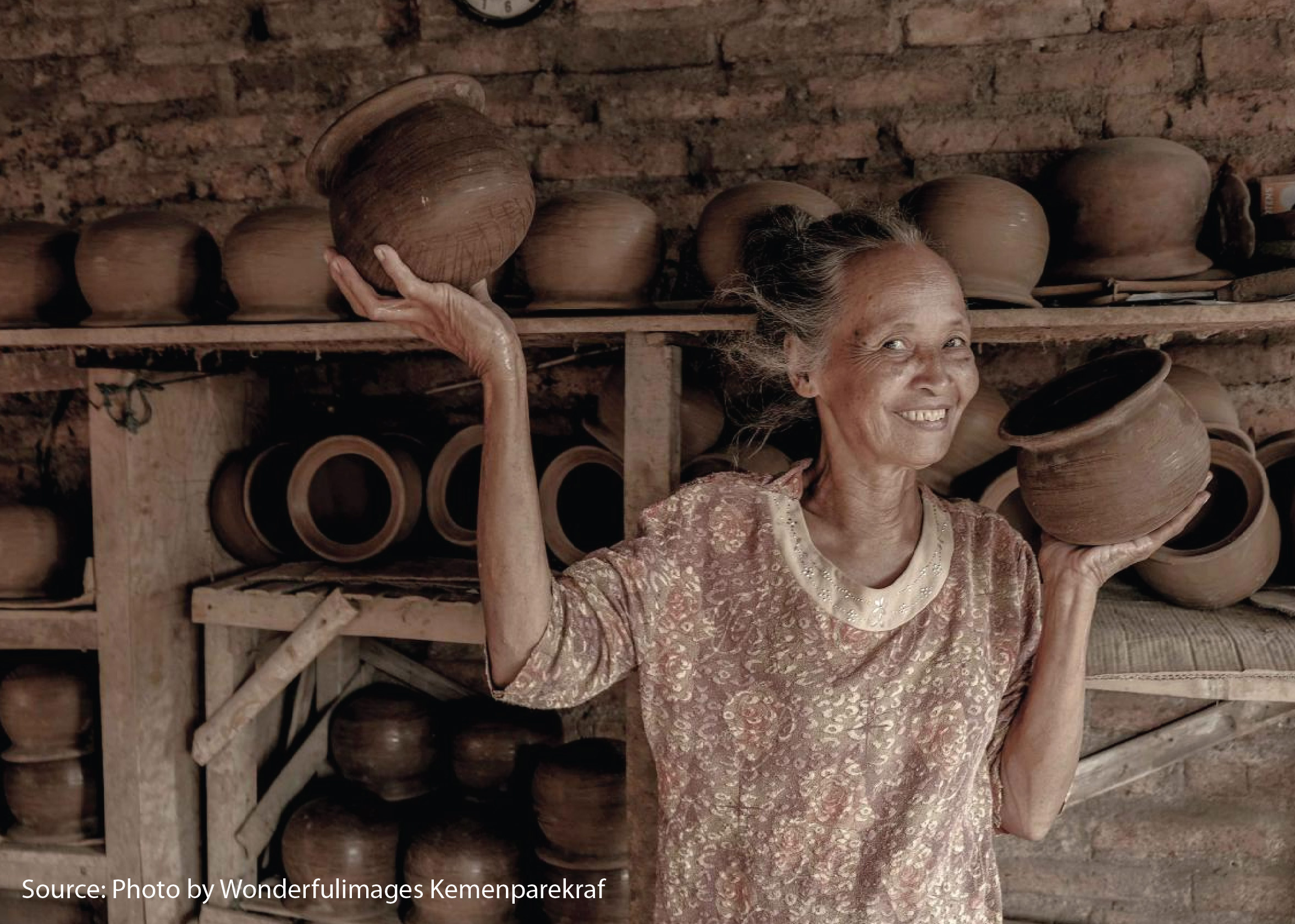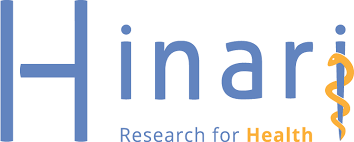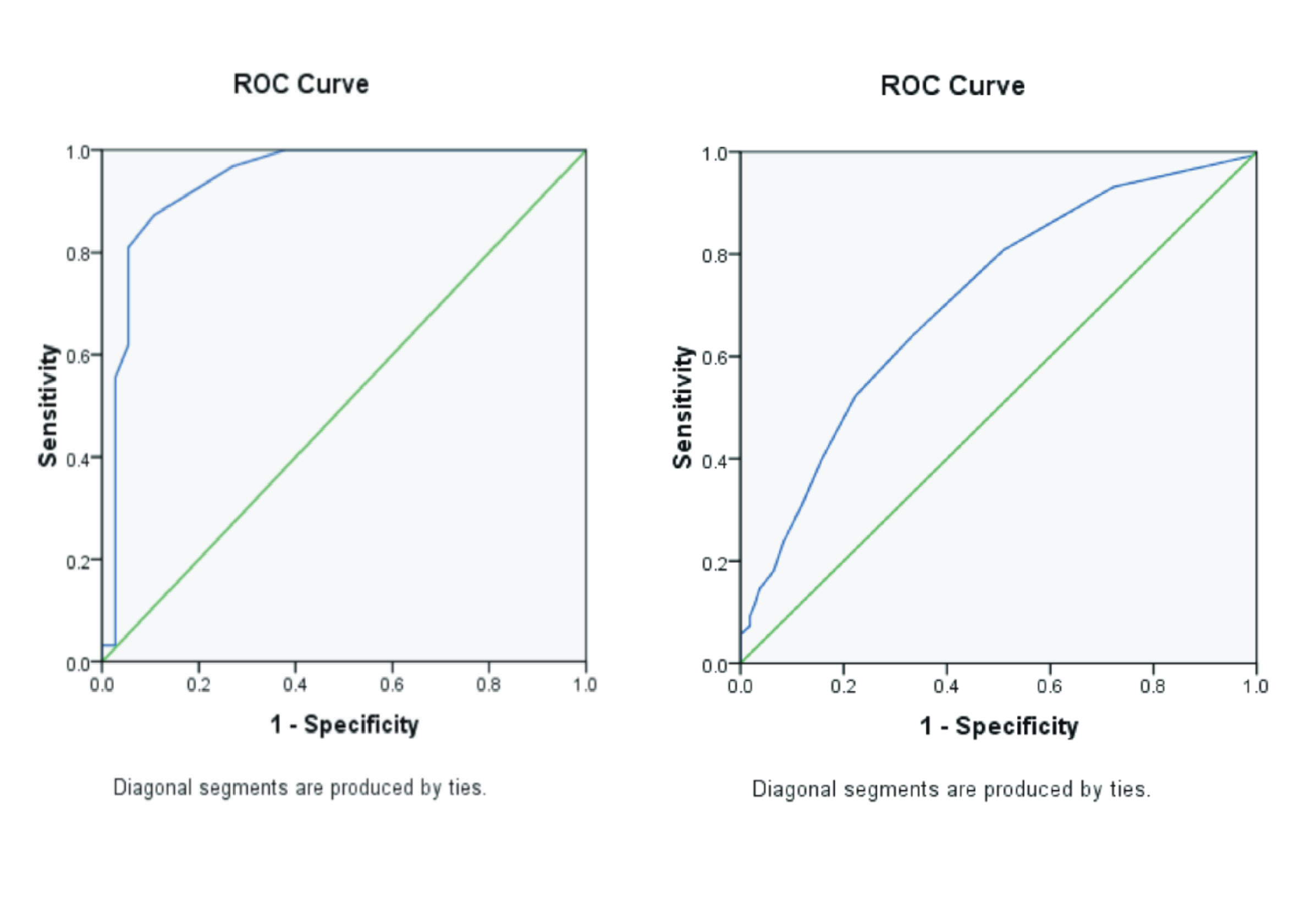THE ROLE OF INDIVIDUAL CHARACTERISTICS, PSYCHOSOCIAL ENVIRONMENTS, WORK FATIGUE, AND CALORIC ADEQUACY IN PERFORMANCE AMONG FEMALE POTTERY ARTISANS IN KARANGANYAR, BOROBUDUR

Background: Pottery making is a vital tourism-supporting industry in Karanganyar, Borobudur, predominantly operated by female workers. Purpose: Investigate the factors influencing the performance of female pottery workers in Karanganyar. Method: A cross-sectional approach was employed and respondents were selected using simple random sampling techniques, yielding 43 participants out of 70 female workers. Data were collected using questionnaires and measurement devices (reaction timer, stature meter, and digital weight scale), then analyzed using Chi-square. Variables such as performance, psychosocial environment in the workplace, individual characteristics (age, marital status, number of children, and length of service), fatigue, and calorie adequacy were measured. The Copenhagen Psychosocial Questionnaire (COPSOQ) and the Individual Work Performance Questionnaire (IWPQ) were employed to assess psychosocial environments and performance, respectively. Result: The majority of pottery workers were 41 - 50 years old (32.56%), were married (93.02%), had 1 - 2 children (46.51%), and had more than 30 years of services (46.51%). Calorie deficits affected 41.86% workers, with 62.79% showing moderate performance, 81.40% experiencing a moderate psychosocial environment, and 48.84% facing mild fatigue. The Chi-square test revealed a significant association between age (p-value = 0.023), fatigue (p-value = 0.033), psychosocial environment (p-value = 0.022), and calorie adequacy (p-value = 0.047) toward performance. Conclusion: The findings highlight the importance of age, psychosocial environments, work fatigue, and calorie intake on the performance of female pottery workers.
Introduction
Borobudur is one of the super priority destinations currently under the development focus of the Indonesian government. In addition to the temples, one of the region’s assets and tourist attractions is the existence of various handicraft centers scattered across villages in the Borobudur area, including pottery making. This pottery craft can be categorized as a small business run informally and managed individually by local citizens. As a supporting business for the Borobudur tourist area, the development of this industry is vital for the sustainability of tourism in this region. However, this craft business is not exempt from the challenges commonly encountered by other informal sectors. Poor work organization, inadequate access to clean water and proper sanitation, ergonomic hazards, and the use of heavy manual equipment are characteristics of this sector (Nag et al., 2016(Nag et al., 2016)).
Perceived organizational support has been found to impact well-being and performance positively (Meyers et al., 2020(Meyers et al., 2020)). However, many self-employed informal workers, including pottery makers lack work structure, organizational support, and supervision, relying heavily on individual motivation for performance (Mayangsari et al., 2020(Mayangsari et al., 2020); Wolfe and Patel, 2019(Wolfe & Patel, 2019)). The dual role conflict between work and family responsibilities can lead to overwhelming challenges, stress, and subsequent effects on performance for female workers, (Muis et al., 2021(Muis et al., 2021)). Women, particularly those in self-employment, experience a higher prevalence of mental health problems attributed to stress compared to men (Arias-de la Torre et al., 2016(Torre et al., 2016)). This stress disparity significantly impacts women’s performance. The textile industry, as studied by Andarini and Prasetya (2017)(Andarini & Prasetya, 2017), demonstrates a strong correlation between stress levels and fatigue among female workers. Stress and fatigue experienced by workers can lead to a decline in task performance and a reduced capacity for mental and physical activities, resulting in critical errors and accidents (Sadeghniiat-Haghighi and Yazdi, 2015(Sadeghniiat-Haghighi & Yazdi, 2015)).
Occupational Health and Safety(OHS) aspects in the informal sector work environment are often inadequate and not protected by labor regulations. Thus, workers in this sector are closely associated with poor health status, especially in countries with lower-middle incomes (Montero-Moraga et al., 2020(Montero-Moraga et al., 2020)). Nutrition interventions in the workplace are a health sector initiative that may be made to improve performance and productivity (Maes et al., 2012(Maes et al., 2012)). Workers’ energy and nutritional demands must be met for them to stay healthy and perform efficiently and effectively. Workers fail to consume an adequate and balanced diet are more likely to be involved in work accidents and have insufficient energy (Kartasapoetra, 2003(Kartasapoetra, 2003)). The lack of nutritional value in food consumed by workers can also result in diminished immunity and physical capacities, lack of desire, and decreased perceptive speed, all of which can reduce job productivity(Ramadhanti, 2020(Ramadhanti, 2020)). This is consistent with Rahmawati’s study, which found that calorie intake, breakfast habits, and nutritional status are associated with worker productivity (Rahmawati et al., 2023(Rahmawati et al., 2023)). Inadequate calorie intake can lead to a ecrease in skeletal muscle mass, resulting in weakness, decreased physical performance, and a loss of overall muscle strength. It can also cause a decline in intracellular and total body water, impacting hydration levels and impairing essential bodily functions, which in turn can negatively affect workers performance (Zalejska-Fiolka et al., 2022(Zalejska-Fiolka et al., 2022)).
Psychosocial risk factors in informal workers are typically found in this research field. According to a study by Gimeno Ruiz de Porras in Central America, informal workers reported a higher prevalence of psychosocial and musculoskeletal disease risk factors (Gimeno Ruiz de Porras et al., 2017(Porras et al., 2017)). The working relationship, including employer and employee interaction, shapes the work environment. However, due to their non-formal working relationship, informal workers have limited involvement in the organization and are deprived of the ability to influence work relationships. These conditions place them in a vulnerable position and increase their vulnerability to psychosocial risk factors (Montero-Moraga et al., 2020(Montero-Moraga et al., 2020)). However, some studies present conflicting findings that show self-employed individuals might be more satisfied with their occupations, which is paradoxical considering their poor quality of work conditions (Wolfe and Patel, 2019(Wolfe & Patel, 2019)).
The understanding of how the unique working conditions of informal and self-employed workers relate to their performance is still unclear, and even scarcer in women informal self-employed workers. In the preliminary survey, it was found that the pottery artisans in Karanganyar were predominantly female workers engaged in informal employment with inadequate equipment standards. They often worked independently, without assistance from colleagues. Working from home, they bore a dual burden, involving both their roles as pottery artisans and their domestic household responsibilities. These conditions made them susceptible to fatigue and psychosocial disturbances. Furthermore, many of these workers had irregular and insufficient dietary habits, resulting in inadequate nutrition and calorie intake. Therefore, the purpose of this research is to determine the relationship between psychosocial environment, individual characteristics (age, marital status, number of children, and length of service), work fatigue, and calorie intake on the individual performance of female pottery workers in Karanganyar village, Borobudur Sub-district.
Material and Method
This research has received ethical approval from The Health Research Ethic
Andarini, Y.D., Prasetya, T.A.E., 2017. The Correlation of Occupational Stress with Subjective Fatigue Women Workers in Weaving Loom Unit PT. X. Journal of Vocational Health Studies Vol. 1(1), Pp. 18-22.
Anita, R., Abdillah, M., Wu, W., Sapthiarsyah, M., Sari, R., 2020. Married Female Employees’ Work-Life Balance and Job Performance: The Role of Affective Commitment. Pertanika Journal of Social Science and Humanities Vol. 28(3), Pp. 1787–1806.
Arias-de la Torre, J., Artazcoz, L., Molina, A.J., Fernández-Villa, T., Martín, V., 2016. Inequalities in Mental Health in The Working Population of Spain: A National Health Survey-Based Study. Gaceta Sanitaria Vol. 30(5), Pp. 339-344.
Arsanti, S.M., Farapti, F., Rachmah, Q., 2023. Relationship between Adequacy Level of Nutritional Intake, Hydration Status, and Work Fatigue with Employee Productivity of PT. PAL Indonesia (Persero). Media Gizi Indonesia Vol. 18(1), Pp. 28-37.
Atiqoh, J., Wahyuni, I., Lestantyo, D., 2014. Faktor-Faktor yang Berhubungan dengan Kelelahan Kerja pada Pekerja Konveksi Bagian Penjahitan di CV. Aneka Garment Gunung Pati Semarang. Jurnal Kesehatan Masyarakat Vol. 2(2), Pp. 119-126.
Berthelsen, H., Hakanen, J.J., Westerlund, H., 2018. Copenhagen Psychosocial Questionnaire - A Validation Study using The Job Demand-Resources Model. Plos One Vol. 13(4), Pp. e0196450.
Cicognani, E., Albanesi, C., Valletta, L., Prati, G., 2020. Quality of Collaboration within Health Promotion Partnerships: Impact on Sense of Community, Empowerment, and Perceived Projects’ Outcomes’. Journal of Community Psychology Vol. 48(2), Pp. 323-336.
Dirgayudha, D., 2014. Faktor-Faktor yang Berpengaruh terhadap Kelelahan Kerja pada Pembuat Tahu di Wilayah Kecamatan Ciputat dan Ciputat Timur Tahun 2014 (Skripsi). Universitas Islam Negeri Syarif Hidayatullah, Program Studi Kesehatan Masyarakat Fakultas Kedokteran dan Ilmu Kesehatan.
Gimeno Ruiz de Porras, D., Rojas Garbanzo, M., Aragón, A., Carmenate-Milián, L., Benavides, F.G., 2017. Effect of Informal Employment on The Relationship between Psychosocial Work Risk Factors and Musculoskeletal Pain in Central American Workers. Occupational and Environmental Medicine Vol. 74(9), Pp. 645-651.
Hamouche, S., Parent-Lamarche, A., 2022. ‘Teleworkers’ Job Performance: A Study Examining The Role of Age as An Important Diversity Component of Companies. Journal of Organizational Effectiveness: People and Performance Vol. 10(2), Pp. 293-311.
Harris, K., Krygsman, S., Waschenko, J., Laliberte Rudman, D., 2018. Ageism and The Older Worker: A Scoping Review. Gerontologist 58(2), Pp. e1-e14.
Kartasapoetra, G. M., 2003. Ilmu Gizi : Korelasi Gizi, Kesehatan dan Produktivitas Kerja. Rineka Cipta, Jakarta.
Koopmans, L., Bernaards, C., Hildebrandt, V., Buuren, S., van der Beek, A., De Vet, H., 2014. Improving The Individual Work Performance Questionnaire using Rasch Analysis. Journal of Applied Measurement Vol. 15(2), Pp. 160-75.
Kuwabara, A., Ogawa-Shimokawa, Y., Tanaka, K., 2011. Body Weight Divided by Squared Knee Height as An Alternative to Body Mass Index. Medical Hypotheses Vol. 76(3), Pp. 336-338.
Lim, J., Kwok, K., 2016. The Effects of Varying Break Length on Attention and Time on Task. Human Factors Vol. 58(3), Pp. 472-481.
Maes, L., Van Cauwenberghe, E., Van Lippevelde, W., Spittaels, H., De Pauw, E., Oppert, J.-M., Van Lenthe, F.J., Brug, J., De Bourdeaudhuij, I., 2012. Effectiveness of Workplace Interventions in Europe Promoting Healthy Eating: A Systematic Review. European Journal of Public Health Vol. 22(5), Pp. 677-683.
Maulida, D., Silaban, G., Salmah, U., 2023. The Effect of Physical Workload on Work Fatigue of Expedition Courier in Banda Aceh. International Journal of Health, Education & Social (IJHES) Vol. 6(6), Pp. 76-87.
Mayangsari, L., Restianti, T., Saputra, J., Rahadi, R.A., 2020. The Relationship between Self Employed Motivation and Individual Work Performance among Online Drivers in West Java, Indonesia. International Journal of Innovation, Creativity and Change Vol. 13(3), Pp. 513-530.
Meyers, A.L., Woodbury, M.P., Nelson, R.A., 2020. Orthopedic Manifestations of Lead Toxicity. Orthopedics Vol. 43(4), Pp. e202-e207.
Montero-Moraga, J.M., Benavides, F.G., Lopez-Ruiz, M., 2020. Association between Informal Employment and Health Status and The Role of The Working Conditions in Spain. International Journal of Health Services: Planning, Administration, Evaluation Vol. 50(2), Pp. 199-208.
Muis, M., Nai’em, M.F., Arsin, A.A., Darwis, A.M., Thamrin, Y., Hans, N.A.P., 2021. The Effect of Multiple Role Conflicts and Work Stress on The Work Performance of Female Employees. Gaceta Sanitaria, The 1st International Conference on Safety and Public Health Vol. 35(Suppl. 1), Pp. S90-S93.
Nag, A., Vyas, H., Nag, P., 2016. Occupational Health Scenario of Indian Informal Sector. Industrial Health Vol. 54(4), Pp. 377-385.
Narpati, J.R., Ekawati, E., Wahyuni, I., 2019. Hubungan Beban Kerja Fisik, Frekuensi Olahraga, Lama Tidur, Waktu Istirahat dan Waktu Kerja dengan Kelelahan Kerja (Studi kasus pada pekerja Laundry Bagian Produksi di CV.X Tembalang, Semarang). Jurnal Kesehatan Masyarakat Vol. 7(1), Pp. 337-344.
Nishisaka, M.M., Zorn, S.P., Kristo, A.S., Sikalidis, A.K., Reaves, S.K., 2022. Assessing Dietary Nutrient Adequacy and the Effect of Season-Long Training on Body Composition and Metabolic Rate in Collegiate Male Basketball Players. Sports (Basel) Vol. 10(9), Pp. 127.
Novanda, A.W., 2014. Hubungan Pemenuhan Kebutuhan Kalori Kerja dengan Produktivitas di Pabrik Sepatu (Skripsi). Fakultas Kesehatan Masyarakat, Universitas Airlangga, Surabaya.
Novanda, A.W., Dwiyanti, E., 2014. Hubungan Pemenuhan Kebutuhan Kalori Kerja dengan Produktivitas di Pabrik Sepatu. The Indonesian Journal of Occupational Safety and Health Vol. 3(2), Pp. 117–127
Rahmawati, Y.D., Khasanah, L., Wahyani, A.D., 2023. Hubungan Asupan Kalori, Kebiasaan Sarapan dan Status Gizi dengan Produktivitas Kerja Karyawan Universitas Muhadi Setiabudi | Jurnal Ilmiah Gizi Kesehatan (JIGK). Jurnal Ilmiah Gizi Kesehatan (JIGK) Vol. 4(2), Pp. 20-25.
Ramadhanti, A.A., 2020. Status Gizi dan Kelelahan terhadap Produktivitas Kerja. Jurnal Ilmiah Kesehatan Sandi Husada Vol. 9(1), Pp. 213-218.
Ramos-Villagrasa, P.J., Barrada, J.R., Río, E., Koopmans, L., 2019. Assessing Job Performance using Brief Self-report Scales: The Case of The Individual Work Performance Questionnaire. Revista de Psicología del Trabajo y de las Organizaciones Vol. 35(3), Pp. 195-205.
Sadeghniiat-Haghighi, K., Yazdi, Z., 2015. Fatigue Management in The Workplace. Industrial Psychiatry Journal Vol. 24(1), Pp. 12-17.
Sagherian, K., Clinton, M.E., Abu-Saad Huijer, H., Geiger-Brown, J., 2017. Fatigue, Work Schedules, and Perceived Performance in Bedside Care Nurses. Workplace Health & Safety Vol. 65(7), Pp. 304-312.
Şahin, S., Arıcı Özcan, N., Arslan Babal, R., 2020. The Mediating Role of Thriving: Mindfulness and Contextual Performance among Turkish Nurses. Journal of Nursing Management Vol. 28(1), Pp. 175-184.
Toscano, F., Zappalà, S., 2020. Social Isolation and Stress as Predictors of Productivity Perception and Remote Work Satisfaction during The COVID-19 Pandemic: The Role of Concern about The Virus in A Moderated Double Mediation. Sustainability Vol. 12(23), Pp. 9804.
Tucker, P., Folkard, S., 2012. Working Time, Health, and Safety: A Research Synthesis Paper (Working Paper).
Van der Lippe, T., Lippényi, Z., 2020. Co-Workers Working from Home and Individual and Team Performance. New Technology, Work and Employment Vol. 35(1), Pp. 60-79.
Wardana, R.K., Widyastuti, N., Pramono, A., 2018. Hubungan Asupan Zat Gizi Makro dan Status Gizi Ibu Menyusui dengan Kandungan Zat Gizi Makro pada Air Susu Ibu (ASI) di Kelurahan Bandarharjo Semarang. Journal of Nutrition College Vol. 7(3), Pp. 107-113.
Widyastuti, T., Hidayat, R., 2018. Adaptation of Individual Work Performance Questionnaire (IWPQ) into Bahasa Indonesia. International Journal of Research Studies in Psychology Vol. 7(2), Pp. 101-112.
Wolfe, M.T., Patel, P.C., 2019. Labor of Love? The Influence of Work-Conditions among Self-Employed and Work Stress. Journal of Business Venturing Insights Vol. 11, Pp. e00118.
Zalejska-Fiolka, J., Birková, A., Wielkoszyński, T., Hubková, B., Szlachta, B., Fiolka, R., Błaszczyk, U., Kuzan, A., Gamian, A., Mareková, M., Toborek, M., 2022. Loss of Skeletal Muscle Mass and Intracellular Water as Undesired Outcomes of Weight Reduction in Obese Hyperglycemic Women: A Short-Term Longitudinal Study. International Journal of Environmental Research and Public Health Vol. 19(2), Pp. 1001.
Copyright (c) 2025 Journal of Vocational Health Studies

This work is licensed under a Creative Commons Attribution-NonCommercial-ShareAlike 4.0 International License.
- The authors agree to transfer the transfer copyright of the article to the Journal of Vocational Health Studies (JVHS) effective if and when the paper is accepted for publication.
- Legal formal aspect of journal publication accessibility refers to Creative Commons Attribution-NonCommercial-ShareAlike (CC BY-NC-SA), implies that publication can be used for non-commercial purposes in its original form.
- Every publications (printed/electronic) are open access for educational purposes, research, and library. Other that the aims mentioned above, editorial board is not responsible for copyright violation.
Journal of Vocational Health Studies is licensed under a Creative Commons Attribution-NonCommercial-ShareAlike 4.0 International License














































